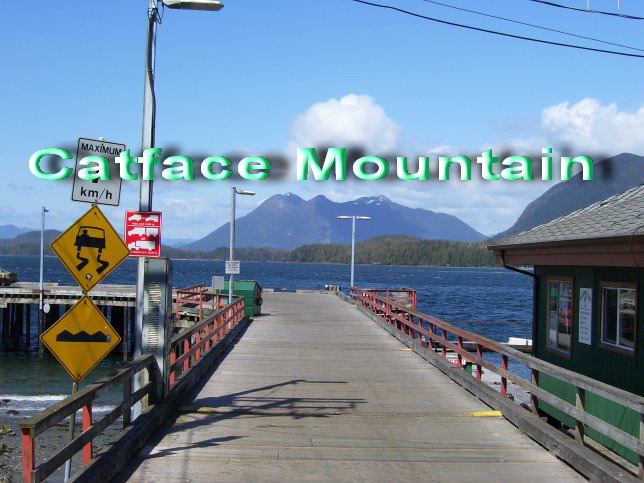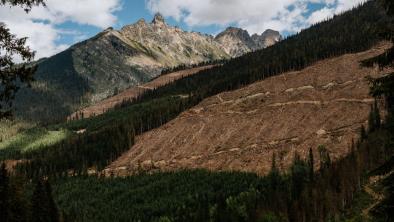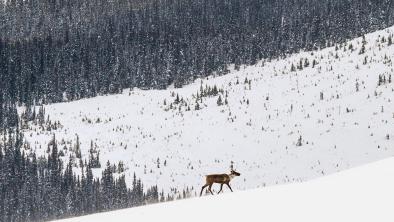Ahousaht First Nations under fire in two protests in one week
Westerly News

Photo: Catface Mountain as seen from Tofino First Street Dock
In two separate protests last week, it seems environmentalists and the Ahousaht First Nation have different ideas about aquaculture and mining in Clayoquot Sound.
A group of B.C. First Nations traveled to Ottawa and Norway last week with Mainstream Canada officials to tour the open-net fish farm operations of its parent company, Cermaq.
The group bumped heads with a Canadian delegation including Darren Blaney, Homalco First Nation, Nicole Mckay, Wilderness Tourism Association of B.C., and professor Neal Frazer who were in Oslo to oppose open-net fish farming.
Cermaq invited the First Nation group to its annual general meeting (AGM) and outside the building protesters held up signs in an effort to get the aquaculture company to shift from open-net fish farms to land-based, closed containment facilities.
"With open net cage fish farming is the inevitability of losing control of sea lice populations and disease outbreaks," Blaney said in a statement emailed to the Westerly. "We chase temporary solutions at the expense of... the environment as these [sea lice] outbreaks do not respect boundaries or traditional territories in the case of First Nations."
Blaney said that it's fine for some communities to sign fish farm protocols but "when you start taking food off the plate of First Nations in coastal and interior B.C., there is immense disrespect to rest of us who are trying to preserve our rights and culture."
"Closed containment would be the greatest respect and permanent solution."
Ahousaht signed a new protocol in January with Mainstream Canada to allow between 13 to 16 active open-net fish farms in its territory; the two have worked together for the past 10 years.
The protocol guarantees that half of the 150 aquaculture jobs must be filled by B.C. First Nations.
Maquinna (Lewis George), Ahousaht's hereditary chief, and Wally Samuel, Ahousaht's fish farm committee co-chair, were among the group visiting Norway to learn more about Cermaq's operation in a tour that included attending the AGM, seeing its facilities in Steigen and the research from EWOS Innovation.
In a Cermaq media release Maquinna said the protocol signed between Mainstream and Ahousaht is important to the territory because it's a mutual agreement based on respect.
"I respect that hereditary chiefs have different views on fish farming in their territories," he said. "Likewise I expect that the view of the Ahousaht for their territory too will be respected."
On March 27, when Ahousaht and Mainstream Canada celebrated its protocol signing, Samuel told the Westerly that salmon was a priority of his people's livelihood.
"We eat it, fish it, but that's why we're more involved in the [fish farm] locations," he explained. "We know where the fish run.... Yes, we're caught between a rock and a hard place. But, right now it's our livelihood."
This was the second protest in the span of May 19 to 20 where Ahousaht's choices were met with vocal disagreement.
On May 19, about three-dozen people affiliated with the Friends of Clayoquot Sound (FCOS) and the Western Canada Wilderness Committee gathered in front of a Vancouver building where Imperial Metals Corporation was hosting its annual general meeting.
The protesters waved banners, handed out leaflets of information and gave speeches in an effort to prevent a potential copper mine on Catface Mountain in Clayoquot Sound.
"A mine would blast off the top of Catface Mountain--a location highly visible from Tofino and the other communities of Clayoquot," according to a statement from the FOCS. "Copper mines are some of the worst polluting mines, so there's a lot more than just the view at stake."
Catface Mountain is in the UNESCO biosphere reserve and the Ahousaht First Nation's traditional territory.
Imperial acquired Selkirk Metals and is currently conducting tests on the mountain across the water from Tofino's harbour. The company has stated it will continue its exploratory drilling program into 2010.
John Frank, Ahousaht's chief councillor, said no one has so far come forward to speak with his community on opposition to the mine.
"We don't want to get confrontational with anyone...we want to get along with people in our sand box, so to speak," he told the Westerly.
Whether or not Ahousaht wants to get confrontational, groups who oppose open net fish farms and copper mines are determined to shift operations to become what they see as more environmentally sound.
In a media release on May 19 Ahousaht's hereditary chiefs demanded outsiders stop undermining its leaders and their decision-making process for land use and economic development.
"We are more than capable of making decisions that impact our people and our land," Kiista, an Ahousaht First Nation member, said. "We do not need uninformed outsiders making decisions or pronouncements without our consent."
Ahousaht is about a 45-minute boat ride from Tofino's harbour. The community has more than 2,000 members and approximately 1,000 residents living at the reserve on Flores Island.


